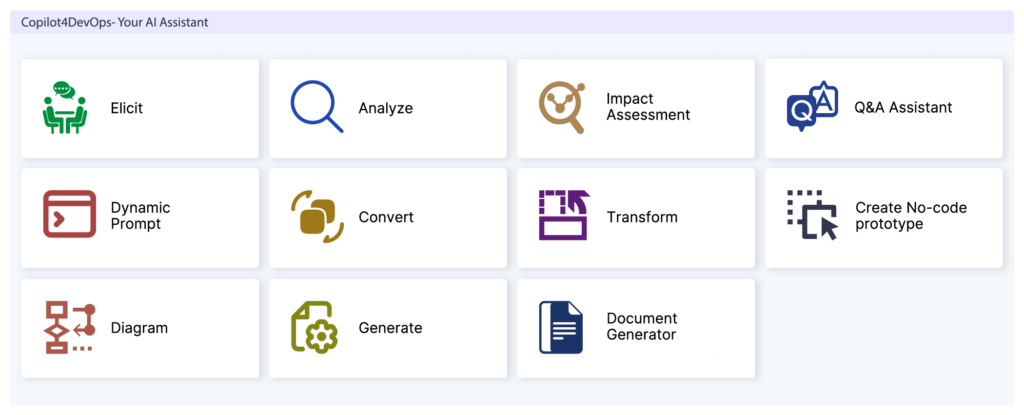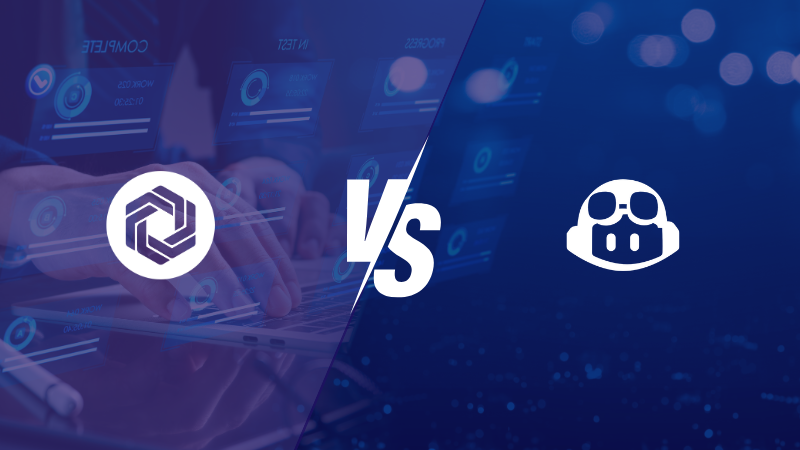How Copilot4DevOps Complements GitHub Copilot: Why Do DevOps Teams Need a Specialized Tool?

Table of Contents
DevOps is a philosophy that connects the software development and IT operations teams for efficient software delivery. According to Spacelift, 83% of IT organizations have adopted DevOps practices to improve software delivery.
DevOps uses automation tools for the frequent releases of software. However, if teams don’t use the right tools to automate the DevOps process, their efficiency can be hindered.
Github Copilot assists developers in the development phase by providing code suggestions. However, it is not enough to automate the DevOps processes throughout.
This is where Copilot4DevOps steps in. It helps DevOps teams automate requirements management, pseudo-code writing, test cases, test script generation, etc., processes.
This blog covers the limitations of generative AI tools like GitHub Copilot and how Copilot4DevOps can fill those gaps.
GitHub Copilot: A Powerful AI for Coding

DevOps contains multiple phases, and development is one of the important phases. In this phase, writing the code is the most time-consuming part. Developers spend hours developing code logic, writing structured code, and debugging errors. GitHub Copilot, developed by Microsoft, is an AI tool that simplifies the code-writing process.
GitHub Copilot uses AI to auto-suggest the code, generate the basic test cases, and improve the existing code. The AI chat of GitHub Copilot allows developers to ask questions related to the project or any topic of software development. With these AI features, the tool increases the overall code-writing efficiency of the development team.
Key Features of GitHub Copilot
In this section, we will explore the key features of GitHub Copilot, and you will gain knowledge about how it can streamline the software development process.
1. AI-powered Code Suggestion
GitHub Copilot provides code suggestions for writing whole functions and even complex algorithms. You can start typing the code, and it will automatically suggest the code, which you can accept or reject. It also understands the inline comments and suggests the code blocks based on that.
The tool doesn’t suggest any random lines of code, but it analyzes the file you are currently editing and other related files to provide suggestions. So it provides accurate code suggestions to the developers.
2. Integration with Popular IDEs
GitHub Copilot seamlessly integrates with code editors like Visual Studio Code, Visual Studio, JetBrains IDEs, Eclipse IDE, and Xcode. This way, it offers code suggestions directly inside the editor without requiring additional configuration.
3. AI-powered Chat
Copilot chat allows you to ask questions related to the code. It uses natural language processing to understand users’ questions and provides related answers. Developers can use the tool to understand how multiple code components work together.
Furthermore, Copilot chat can also answer general questions related to software development. For instance, if you don’t know the loop’s syntax in Python, you can directly ask the Copilot chat and quickly understand it.
4. Automate the Code Review
Copilot AI can automatically review your code and suggest changes. After that, you can apply these changes to the code with a few clicks.
In the Visual Studio Code IDE, you can select a particular code section and ask the Copilot to review it. In GitHub, you can ask the Copilot to review all changes.
5. Multi-Language Support
GitHub Copilot supports hundreds of programming languages, such as Python, Java, C++, C#, Go, etc. It can also help developers to design web pages using HTML, CSS, and JavaScript. Other than this, developers can also use it to write code for web development frameworks like React, NextJS, etc.
6. Copilot Knowledge Base
This feature is only available in the Enterprise version of Copilot. It allows developers to create a collection of documents to use as a context when you chat with Copilot. While chatting, you can specify the particular knowledge base as a context to get answers from the selected documents.
Also Read: 10 Best DevOps Automation Tools to Simplify Software Development Workflows in 2025
Why GitHub Copilot Isn’t Enough for DevOps
GitHub Copilot can be a good choice for getting code suggestions, but DevOps is much more than that. DevOps teams deal with requirements management, impact assessment, automation, and documentation, areas where GitHub Copilot lacks support.
Here’s why it falls short for DevOps:
- Contextual Understanding: GitHub Copilot can generate a code block, but it often lacks a deep understanding of the context of the project. This happens when projects have lots of files that have interdependencies. Due to this, sometimes, it struggles to provide the correct code suggestions.
- Limited Test Case Generation Capabilities: Copilot has limited capabilities to generate test cases. In most cases, it doesn’t provide edge cases or generate totally wrong test cases that don’t align with actual code implementations.
- Limited Support for Non-Code Tasks: Copilot primarily focuses on code generation and doesn’t assist with other aspects of development, such as requirements gathering, impact assessment, or documentation creation.
- Lacks Automated Document Creation: DevOps requires detailed documentation for requirements, workflows, and deployments. GitHub Copilot can generate code but not comprehensive project documentation or SOPs.
- Doesn’t Support Functional Prototype Creation: It doesn’t allow developers to create a no-code functional prototype, which is very important at the beginning of development to assess how the final product will behave.
- Privacy and Licensing Issues: GitHub Copilot is trained on the code of GitHub’s public repositories. So, suggestions provided by the tool can also contain code with copyrights. This can lead to potential legal and ethical concerns.
In the next section, we will see how you can overcome these challenges by using Copilot4DevOps.
Meet Copilot4DevOps: The AI Assistant Built for DevOps Teams

As discussed previously, GitHub Copilot lacks support for requirement management, impact assessment, document creation, and so on.
Copilot4DevOps is developed to cater to these needs. It is an AI Assistant for Azure DevOps that automates everything relating to requirements management, documentation, impact analysis, and workflow optimization—all within Azure DevOps. Integrating AI into DevOps workflows ensures that teams can streamline their processes, reduce risks, and improve collaboration.
So, let’s see all the key features that make Copilot4DevOps mandatory for DevOps teams.
Key Features of Copilot4DevOps

1. AI-Powered Requirements Elicitation
Software development always starts with requirements gathering. One of the biggest challenges is ensuring that requirements are well-defined and aligned with business objectives.
Copilot4DevOps allows DevOps teams to collect well-structured requirements from the raw input data using AI. After that, teams can create work items within Azure DevOps by using these AI-generated requirements.
2. Work Item Analysis and Optimization
Copilot4DevOps allows teams to use industry-standard options like the 6C Framework, PABLO Criteria, and INVEST Framework to analyze the work items. Once the analysis is done, it provides feedback for the improvements.
This feature helps teams to optimize their backlog by identifying potential conflicts and redundant tasks.
3. Pseudocode and Test Script Generation
Like GitHub Copilot, Copilot4DevOps also helps developers write pseudocode in different programming languages, such as Java, Python, C++, C#, etc.
This tool analyzes descriptions of selected work items and automatically generates test cases. This ensures that test coverage is robust and aligned with project requirements, improving software quality.
Try Pseudocode and Test Script Generation with Copilot4DevOps!
4. Q&A Assistance for Work Items
The Q&A assistance of Copilot4DevOps complements the chat feature of GitHub Copilot. It allows teams to ask questions about work items and instantly provides relevant answers.
5. No-Code Functional Prototyping
Prototypes help teams get an idea about the actual product’s functionality. Creating a prototype by writing the code can be time-consuming.
Copilot4DevOps allows teams to create functional prototypes without writing a single line of code. It uses Natural Language Processing (NLP) to analyze the work item’s description and create a fully functional prototype.
6. SOP and Document Generation Using AI
GitHub Copilot doesn’t allow the creation of comprehensive documents, but Copilot4DevOps does.
By using Copilot4DevOps, teams can create well-structured documents with a few clicks. Furthermore, it also helps teams prepare reports, product policy documents, etc.
7. Dynamic Prompt Creation for Azure DevOps
While working with complex projects, DevOps teams are often required to extract meaningful insights from the work items. The “Dynamic Prompt” feature of Copilot4DevOps allows teams to create and manage prompts to get specific results based on personalized needs. This helps retrieve relevant details from work items without manually reviewing the lengthy documentation.
8. AI-Driven Impact Assessment
Before making any changes to the work items, it is very important to analyze how it will impact other work items. Copilot4DevOps automatically evaluates the impact of a change by analyzing dependencies and potential risks before execution.
9. AI-Powered Diagramming
Copilot4DevOps uses machine learning algorithms to automatically generate different diagrams, such as UML diagrams, ERD diagrams, etc., by analyzing the work items. This helps developers to understand the complex workflow of projects easily.
Copilot4DevOps vs. GitHub Copilot: A Feature-by-Feature Comparison

Copilot4DevOps and GitHub Copilot are both AI tools aimed at improving the software development environment. However, the two tools serve different ends. The following is a feature-wise comparison to determine which tool suits a specific need.
| Feature | GitHub Copilot | Copilot4DevOps (Lite/Plus/Ultimate) |
|---|---|---|
| Code Generation | Provides real-time code suggestions. | Yes, it generates pseudocode in various programming languages. |
| AI-Powered Chat | Yes, it provides chat support to answer coding questions and explain code concepts. | The Q&A feature allows users to ask queries and answer them. |
| Multi-Language Support | Yes, it supports hundreds of programming languages for code generation | Yes, it can generate code in various programming languages. |
| Work Item Generation | No | Yes, it generates requirements, features, bugs, etc |
| Work Item Refinement | No | Yes, it supports AI-powered content improvement. |
| Customizable AI Prompts | No | Yes, it offers a Dynamic Prompt feature for tailored queries. |
| Test Case & Script Generation | No | Yes, it generates automated test scripts in multiple languages. |
| AI Model Variety | No Customization | Yes, supports GPT-4o, GPT-4o mini, o3 mini, and o1 mini. |
| Data Security & Compliance | Inherits GitHub and OpenAI security | Inherits OpenAI & Azure security, compliance-focused. |
| Cost | Paid (subscription-based) | Paid (Lite, Plus, and Ultimate versions) |
| Integration with Azure DevOps | No | Yes, seamless integration within Azure DevOps. |
| Gap Analysis & AI-Assisted Insights | No | Yes, analyzes work item gaps and enhances decision-making. |
| AI-Powered Documentation Support | No | Yes, assists in generating required documents |
| Automate the Code Review | Yes, it can review code and suggest improvements based on coding standards | No, does not perform code review automation |
Why Copilot4DevOps is the Ideal DevOps Tool
In contrast to conventional DevOps tools, which are centered around the CI/CD pipeline, Copilot4DevOps offers comprehensive support for all aspects of tasks, such as requirements management, impact assessment, and even documentation.
Here’s why it stands out:
- AI in DevOps Beyond Code Generation: Co-Pilot4DevOps, unlike GitHub Copilot, goes beyond writing code, as it also offers features like impact analysis, diagram generation, etc.
- Saving Time on Manual Tasks: Teams can automate tasks like requirements capturing, creating documents, reports, etc., using Copilot4DevOps. This saves a good amount of time, allowing team members to focus on other important tasks.
- Integrated into Azure DevOps: It is directly integrated within Azure DevOps, allowing users to generate requirements and create work items within Azure DevOps.
- Enhancing Collaboration Between Teams: Enables alignment between developers, product managers, and DevOps engineers by structuring and optimizing work items.
Through the automation of requirements management, impact assessment, and documentation generation, Copilot4DevOps allows DevOps teams to concentrate on the delivery of quality software in an efficient manner.
Start Using AI In DevOps With A 15-day Free Trial Of Copilot4DevOps!
Closing Thoughts
GitHub Copilot and Copilot4DevOps both cater to different needs.
GitHub Copilot provides real-time code suggestions, helping DevOps teams only during the development phase. On the other hand, Copilot4DevOps allows teams to automate the whole DevOps process, from requirements management to pseudocode writing, test script generation, and even SOP/document generation.
This way, both tools allow teams to automate repetitive tasks. However, you should choose the particular tool based on your specific needs.
Frequently Asked Questions (FAQs)
Q1: How can AI be used for DevOps automation within Azure DevOps?
DevOps teams can use tools like Copilot4DevOps to automate the requirements management workflow within Azure DevOps.
Q2: Can you ask questions to GitHub Copilot?
Yes, GitHub Copilot offers a chat interface where users can ask queries for selected code blocks or general questions related to the programming.
Q3: How can DevOps teams automate requirements management within Azure DevOps?
DevOps teams can use AI-powered requirements management software such as Copilot4DevOps to automate work item creation and refinement.
Q4: Is Copilot4DevOps free to use?
Copilot4DevOps offers three pricing plans, including Plus, Ultimate, and Enterprise. You can check the pricing plans here.










